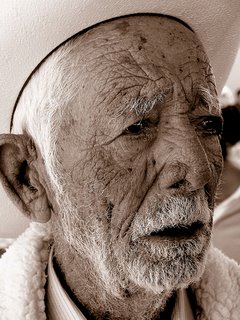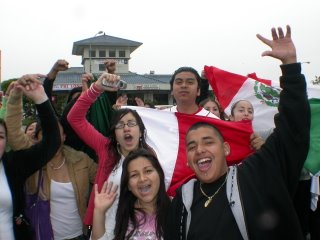 La gente lo conoce como el Abuelo Juan.
La gente lo conoce como el Abuelo Juan.Cuando hablamos de el, decimos "Mi Abuelo".
Nosotros los Mexicanos hacemos eso, hablamos de nuestros padres y nuestros abuelos, diciendo "mi mama o mi abuela". No es nada en contra de nuestros queridos hermanos, para quien claramente, tambien es, pues "nuestra mama o nuestro papa". Solo, es una cosa cultural, es la manera que nosotros usamos nuestro idioma.
Yo me apuro de mi Abuelo. Me apuro de su salud, que si come bien, que si tiene y toma su medicina. Me apuro y pienso cuando lo volvere a ver. Mi temor es que si cuando regrese a verlo aun estara con nosotros.
Nuestros dias aparte de uno al otro se convierten en meses, meses se convierten en años y lo extraño. Otro año sin verlo. Tengo que oir su voz. Tomo el telefono y le llamo. Hola! Abuelito. Como esta? Me dice. "Bien Mijo..y tu...tu familia?" Bien. Bien. Todo bien.
Hablamos de "Los Estados Unidos" de "El Otro Lado". Le gusta contarme historias. Historias de sus jornadas a California, Arizona y Oregon. Jornadas a lugares que no puede pronuciar con nombres, de "Aidajo, Wiescon-son, Miichican" y de el trabajo duro y sucio de el campo.
Le cuento sobre los tiempos dificiles que estan pasando los Mexicanos en Estados Unidos. El me cuenta de sus tiempos como Bracero. Me cuenta de los empleadores que se desaparcian con sus semanas de pago. El recuerda los fondos que fueron deducidos de su cheque para "la pension", el 10% de sus ganancias durante el periodo de 1942 a 1945. Como estos fondos fueron deducidos por el Gobierno Estaunidense, los fondos puestos en una supesta "cuenta de ahorros" y como estos fondos desaparecieron. Estos fondos debian ser pagados a los Braceros cuando regresaran a Mexico. Recuerda que sus ahoros desaparecieron al igual que los de 300,000 otros Braceros y ni el Gobierno Estaunidense o el Gobierno Mexicanos dispuestos a tomar responsabilidad. Los Braceros sin recurso alguno, simplemente siguieron con sus vidas y lo dejaron, pero aun recuerdan.
Pero a pesar de todo, mi Abuelo insiste que su jornada y tiempo en Ameria fue bueno. El habla de el cariño de unos Americanos. De la generosidad de un Policia de Los Angeles blanco que lo paro cuando caminaba por la calle y le hizo preguntas en su poco Español y de un momento saca un billete de Viente Dollares y lo pone en la mano de mi Abuelo y dice "vaya con Dios, amigo". Mi abuelo tiene dulces memorias de un tal, "Mister Ford" que una vez le ayudo a conseguir un trabajo en un factoria con buena paga. El trabajo en la factoria quita de los campos y el calor del sol.
Mi Abuelo dice, "Fueron buenos tiempos, fue una aventura y lo haria otra vez, pero eso es cosa para los nuevos".
Finalmente mi Abuelo me dice Adios. Me dice "Ojala pronto los vea."
Antes de que le pueda responder, siento un nudo en la garganta y mis ojos se empiezan a llenanar de lagrimas, le solo puedo responderle, "Si.. Abuelito. Pronto. Muy pronto".
Technorati Tags: immigration cultural heritage migration mexico family




